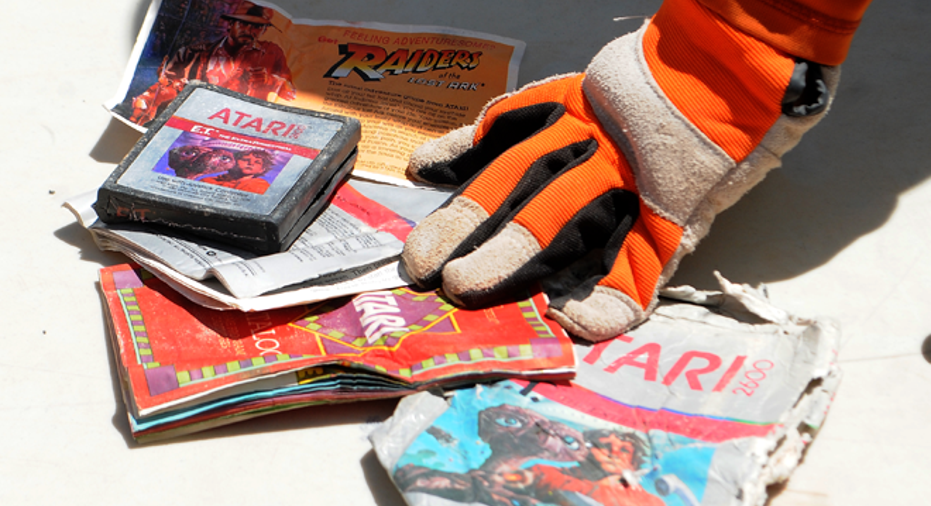Exclusive Q&A: Documentary Producer Chinn on Upcoming Atari Film

Video games have gone Hollywood, but a new documentary recalls those early, halcyon days when a technology startup called Atari first brought the arcade experience into the living room more than three decades ago.
Many fans and serious gamers may not know the back story of how it all began, boomed, and crashed--before many of them were born--or that some of the biggest stars in Silicon Valley had humble beginnings creating code and cartridges for Atari.
Read: Video Games Go Hollywood
Then there’s the unearthing last year of thousands of E.T. game cartridges—widely considered one of the worst games ever-- in a New Mexico landfill. The games were unceremoniously buried under cover of darkness, providing enough intrigue to ensnare a pair of multiple-award winning documentarians wanting to tell that tale as well.
Emmy winning producer Jonathan Chinn and his cousin, double-Oscar winner Simon Chinn, and their LIGHTBOX media company are the driving force behind the documentary series and its first film: “Atari: Game Over.”
The doc will premiere “in fall” and will be distributed by Microsoft (NASDAQ:MSFT) via its Xbox game console; apropos since the software giant embodies the growth and symbiotic relationship between video gaming and the tech revolution.
In an exclusive interview with FOX Business, Jonathan Chinn shared his view on how Atari changed his life, and likely yours, forever and deserves its place as tech revolutionary rabble-rouser…
What drew you to the Atari story?
It was the first entertainment-based Silicon Valley company, and there’s the epic fail (of Atari) and video game crash. It struck us as we hit upon something that would allow us to look at a moment in time through an intriguing, slightly controversial story.
This series (of documentary films) is about seminal and slightly underexposed moments in the digital revolution. When the story came to our attention, I think our first instinct was to think it was a bit of a niche story appealing to gamers. We want the series as a whole to appeal to a broader audience.
While the burial of “ET” cartridges may not stack up against the formation of Apple (NASDAQ:AAPL) or Facebook (NASDAQ:FB) in seminal moments of the digital revolution … I think Atari has a place in that evolution. They don’t exist today, yet they were there before everybody else. Steve Jobs worked there, Steve Wozniak worked there. You can trace back the dot-com boom and philosophy, Atari started all of that, the pot-smoking, geek chic revolution.
(Chinn takes a dramatic pause) The short answer, it was just a really damn good story. Ultimately we’re interested in good stories.
Did you have an Atari 2600 video game console?
I absolutely had the first generation Atari 2600. I remember the day my father brought it back to the house on a weekend. It was probably the most exciting moment in my life at that point. That was another contributing factor to produce the film. I’m not a gamer, I haven’t identified with the hard-core gaming community, but I was a gamer back then. I remember the liberation of having an entertainment system in my house.
My relationship with the digital revolution could be traced back to then. We had it before our first PC.
Have video games truly crossed into mainstream America?
I recently got an Xbox and haven’t played a game since the 2600. It’s changed an enormous amount…Technology is making video games feel in some ways more like movies. It’s a renaissance, the interest in Atari and our film show(s) renewed interest and respect for the video game creator as an artist. The existing boundaries between art and gaming, or film and gaming are getting broken down. The big show runners, filmmakers, all play games: Joss Whedon, J.J. Abrams…they’re coming out of the digital closet.
Were you surprised that Microsoft’s Xbox hired LIGHTBOX to produce documentaries?
We’re living in digital world. The revolutionary part has happened. It’s time to do a series that asks the question: ‘How did we get here?’ And, ‘What does it mean for where we’re heading?’
We thought about who would be interested, and we felt strongly it should be a company that’s part of that (tech revolution)-- Amazon.com (NASDAQ:AMZN), Netflix (NASDAQ:NFLX), Hulu, and until recently, Xbox (Microsoft has essentially shut down its Xbox Entertainment Studios as part of recent, sweeping job cuts), we felt it was a great fit.
Editor’s Note: FOX Business parent 21st Century Fox maintains an ownership position in Hulu.
How many docs will you produce for Xbox?
I can’t answer that, with the closure of Xbox Studios, it’s uncertain. We have two films including ‘Atari’ that are close to being done.
The other film is a very different story. Greg Barker (who directed the “Manhunt” HBO documentary on the hunt for Usama bin Laden) is making a film about the role of citizen journalism in the hours and days after the Boston Bombings. It’s about Reddit and the rush to judgment and the digital and social media witch hunt that went on, mostly for wrong people. It celebrates citizen journalism and asks: “Should there be boundaries for journalism so things like this won’t happen?” There’s no release date--sometime in the next four to six months.



















